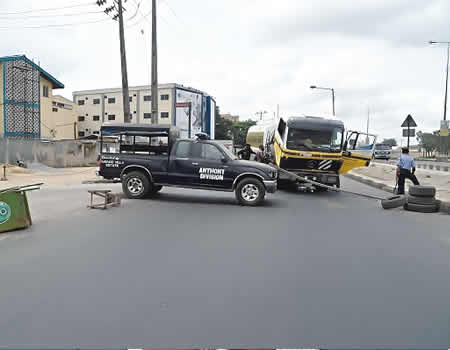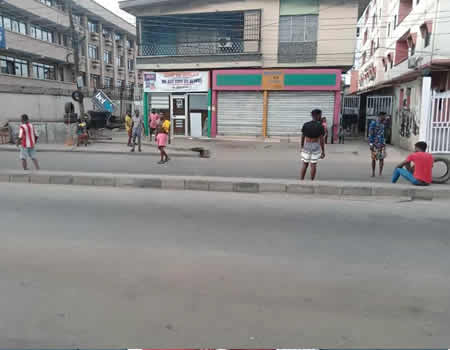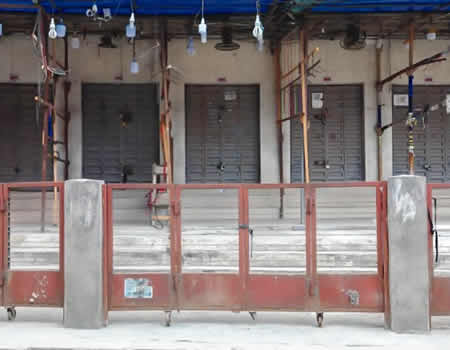SEGUN KASALI, BOLA BADMUS and SUBAIR MOHAMMED set stakeholders’ sight on a prevalent COVID-19 danger many are choosing to ignore.
Five days into the 14-day lockdown of Nigeria’s most populous state and the country’s most commercially viable, experts and the common man have been counting the cost in human and commercial quantities. While it is not lost on nearly everyone that the coronavirus epidemic lockdown will surely cost both the state government and the citizenry a lot in terms of lost business opportunities and everyday financial transactions, one area that many are not focusing on is the mental health of those who were struggling to meet their basic needs before the epidemic threw everyone off balance and the state they are likely to be now, when the opportunity to sustain themselves on a daily basis as in the past, is no longer there for the foreseeable future, because the daily increase in the number of people affected by the raging virus could necessitate an extension of the lockdown, especially in Lagos, where the infection number is gradually climbing up to the 100 mark.
Apart from market women and men who have secured a presidential reprieve to be making money for four hours every other day, another group of daily strugglers in the state is that of commercial drivers and their conductors who rely on daily operation and income to survive, but unlike their trader-counterparts, they are not only completely grounded by the lockdown ordered by Abuja, they also have the social distancing regulation of Governor Babajide Sanwo-Olu to contend with, which forbids them from having a full complement of passengers to allow for distance among the passengers in their vehicles and forestall possible transfer of the virus.
When the social distancing regulation came into effect before the lockdown ordered from Abuja, it was a tug of war between the drivers and enforcement officials of the state government who were out to ensure that the three-passengers-on-a-row order was obeyed. On Monday, before the Buhari ban took effect, drivers of the popular yellow bus, known as danfo in local parlance, had a rough time at the hands of officials of the Ministry of Transport at
Daleko market junction with about five vehicles impounded within minutes for loading their vehicles full of passengers and allowing four passengers on a row of seat.
Saturday Tribune learnt that the drivers of the impounded vehicles have a fixed amount of fine to pay into government coffers before they can take possession of their vehicles again. While the definite amount could not established, general traffic violation fine in the state ranges between N10,000 and N30,000. While N20,000 is the fine for wrongful parking, N10,000 is for the government towing vans which usually move the defaulting vehicles. After running into such heavy financial burden on Monday, their businesses were shut on Tuesday with the date of resumption on the road yet unknown.
Danfo drivers’ arrest a routine —Task Force
When the Public Relations Officer of the Lagos State Environmental Protection Agency (LASEPA), Mrs Bola Ajao, was called on the social distancing enforcement on the drivers, she said the exercise was being coordinated by the police and road safety officials.
Lagos Task Force spokesperson, Mr Taofiq Adebayo, in his response, said the focus was on general offences and picking danfo drivers up didn’t start with COVID-19 crisis. He said: “Arrest of danfo (commercial buses) is a part of our normal daily routine to enforce traffic rules and regulations and not because of the lockdown occasioned by the coronavirus pandemic. It is part of our primary responsibilities to enforce the Lagos State Traffic Laws. We do that on a daily basis and all through, not because of restrictions or any other thing.
“We enforce the laws against those plying one way, stopping and loading at illegal bus stops, as a result of which they constitute hindrance to other road users. So it is a regular, it is a routine duty for us at the Lagos State Task Force. We can’t say this is the number of arrests so far made because we make arrests on a daily basis. It is much like the way LASTMA enforces same laws.
“I don’t have statistics of the average arrests made by us with me. I don’t have the statistics with me but we charge the arrested people to court immediately. Ordinarily, we don’t charge them for any amount, we take them to court, the Lagos State Mobile Court. Once we make arrests, we charge the offenders to court. It is what the magistrate now says that determines how much those that are guilty would pay or whatever.”
When asked of the fate of those convicted but are unable to pay their fine money, Adebayo said, “You know that is no longer in our hand; we have handed over to the court and so whatever issue they now have is with the court.”
Measuring the likely impacts of the lockdown on the psychology of the commercial bus drivers due to the hunger and lack they experience, a University of Lagos’s professor of Psychology, Oni Fagbohungbe, said they are more likely to be frustrated and aggressive on the road. The don said the frustration could either be directed to themselves or their immediate society. The self-directed aggression, he stressed, is the cause of suicide by a frustrated person.
Professor Fagbohungbe said: “On the other hand, socially-directed aggression is that form of aggression that is unleashed on the society at large. The self-directed aggression focuses on self by way of unguided intake of alcohol and drugs and committing suicide. On the other hand, a socially directed aggression is the unjust hike in transport fares, unruly behaviour by commercial bus operators and their recklessness on the wheel. This is a form of aggression that is directed at the society. For many drivers and conductors, frustration and aggression is a high possibility. They are used to earning money on a daily basis but they are denied this due to the lockdown. And the fact is, many of them don’t have savings, they spend as they earn. So, they are likely to feel the impact of the lockdown when they are not allowed to operate. They wake up in the morning realising that they have nothing to do and they have wives and children to feed. Therefore, to cope with the situation, they engage in drunkenness and irrational behaviours and at times, in criminal activities without blinking an eye.”
The Chief Executive Officer, Mental Health Foundation, Mr Owoyemi Emmanuel, who spoke on the after-effects of the lockdown on the drivers, said there would be a desperate run for money, transferred aggression and anger. He noted that the individual personality differences would determine drivers’ responses to the lockdown effects.
“There is no doubt there would be desperate run for money, anger and transferred aggression. How each of us would come out of this lockdown has to do with our individual personalities. The truth is that no one would remain the same after this plague. The fear, panic and anxiety are on us all. Those who survive on daily income and do not have any savings would feel it more as days go by,” Owoyemi said.
Mr Semiu Sobande, a commercial driver who plies Berger area, told Saturday Tribune that there must be a way to get their money back if social distancing is the solution. Sobande explained that social distancing would mean hike in fare as transportation cost could be doubled in order to make sure that drivers do not operate at a loss.
“I am not agitating that social distancing should not be advocated or advised in combating the issue of coronavirus pandemic in the state even as the government moves to ensure strict adherence to the approach. My own take is that the commercial drivers must have a way of ploughing their money back. I would adhere to the principle of social distancing but the passengers should know that they would pay double of the initial fare in order to make sure that we are not running at a loss. The government should know that we too have families and we must put everything together to ensure that we feed them so that they make meaningful contributions to the society,” he said.
He also disclosed that their revenue had been normal despite the social distancing regulation, while confessing that it had been observed mostly in breach by his colleagues. He asked a Saturday Tribune correspondent to point at any park in the state where there is strict adherence to social distancing, adding that they have been carrying out their operations as they used to and making the amounts they normally make.
On the lockdown, the danfo driver stated that although they had lost money due to it but it is for their own good, noting that it is a matter of life and death and “if there is life, there is hope. We will recoup the money lost when we get back in full operation,” he added.
Another commercial driver who runs the same axis, Sola Toyobo, was indifferent about the impact of social distancing on transport fare. He, however, noted that Lagosians have the mechanism to adjust to new ways of life, adding that nothing comes as a shock to them.
“I can’t say anything about the effect of social distancing on transport fare even the aftermath lockdown in the state. All I can say is that Lagosians have an adaptation mechanism of adjusting to new ways of life. If the fare is increased, they won’t be scared. If it remains the same, they remain the same, too. They never get worried. It is always expected by them whenever there is a change in anything in the state, that would directly or indirectly affect the transportation sector,” Toyobo said.
He also confirmed that the social distancing regulation had been mainly side-stepped by his colleagues, noting that his profit margin had been normal as he had also not applied himself to strict compliance of the regulation, as was the case with nearly all commercial buses in the state Toyobo, however, expected the passengers to carry the burden if the enforcement of the social distancing on commercial vehicles becomes stricter, as he envisaged an upward review of the fare.
“We are losing money, huge money, to the shutdown,” he lamented when asked of his opinion on the sit-at-home order of the president.
When asked to put a figure to it, he declined, while maintaining his stance that a lot of money would be lost to the 14 days of inactivity. He called what he does a no-work, no-money job, explaining that an average driver’s income can only be calculated on the basis of his daily operation. “There will certainly be insufficient funds from this lockdown,” he lamented.
ALSO READ: After 14 Days In Isolation, Buhari’s Daughter Reunites With Family
We won’t do crime but… —Conductors
A conductor, Tola Sowemimo, observed that the lockdown should not be a blame game except for those who want to risk their lives, adding that they, as conductors, understand that the situation is for their ultimate good. Sowemimo said there was the need to make do with they have pending when the epidemic would be over and didn’t think the lockdown would propel anyone to taking to crime because it is for a short time and the deadline would soon be over.
Kareem Olusi, another bus conductor, saw it differently. He slammed the government for not making adequate provision for the masses prior to the lockdown, alleging that the government had never, for once, taken the underprivileged into consideration.
An Uber driver, Ologede Tayo, who got his car on hire purchase, stated that the owner of the car understood that the lockdown also applied to Uber drivers, adding that he expected the usual instalmental payment to continue after the period.
Concerning the virus, he noted that the lockdown was necessary at this point when nobody knows who is infected and who isn’t and the virus hasn’t stopped raging.
Another Uber driver, Anthony Igbokwe, noted that all parties to the Uber service have come to the understanding that the lockdown is the best approach, adding that instalmental payment will continue after the lockdown period.
Saturday Tribune learnt that while the social distancing regulation on commercial vehicles has been well observed by vehicles running the inter-state routes, from Oshodi and other major car parks, which is having not more than three passengers on a row of seat to allow for a lot of spacing among the passengers, the reverse has been the case with those running intra-state, a development that was confirmed by drivers and conductors.
If the threat by the enforcement team is also anything to go by, a torrid time certainly awaits the danfo drivers when they resume from the coronavirus holiday.
WATCH TOP VIDEOS FROM NIGERIAN TRIBUNE TV
- Let’s Talk About SELF-AWARENESS
- Is Your Confidence Mistaken for Pride? Let’s talk about it
- Is Etiquette About Perfection…Or Just Not Being Rude?
- Top Psychologist Reveal 3 Signs You’re Struggling With Imposter Syndrome
- Do You Pick Up Work-Related Calls at Midnight or Never? Let’s Talk About Boundaries










